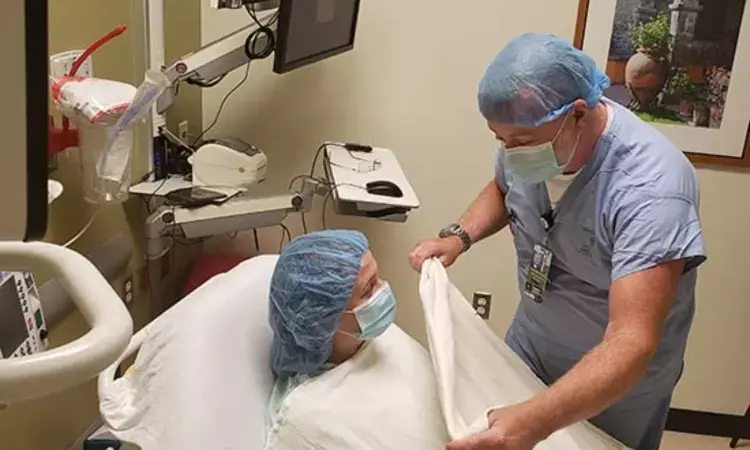- Home
- Medical news & Guidelines
- Anesthesiology
- Cardiology and CTVS
- Critical Care
- Dentistry
- Dermatology
- Diabetes and Endocrinology
- ENT
- Gastroenterology
- Medicine
- Nephrology
- Neurology
- Obstretics-Gynaecology
- Oncology
- Ophthalmology
- Orthopaedics
- Pediatrics-Neonatology
- Psychiatry
- Pulmonology
- Radiology
- Surgery
- Urology
- Laboratory Medicine
- Diet
- Nursing
- Paramedical
- Physiotherapy
- Health news
- Fact Check
- Bone Health Fact Check
- Brain Health Fact Check
- Cancer Related Fact Check
- Child Care Fact Check
- Dental and oral health fact check
- Diabetes and metabolic health fact check
- Diet and Nutrition Fact Check
- Eye and ENT Care Fact Check
- Fitness fact check
- Gut health fact check
- Heart health fact check
- Kidney health fact check
- Medical education fact check
- Men's health fact check
- Respiratory fact check
- Skin and hair care fact check
- Vaccine and Immunization fact check
- Women's health fact check
- AYUSH
- State News
- Andaman and Nicobar Islands
- Andhra Pradesh
- Arunachal Pradesh
- Assam
- Bihar
- Chandigarh
- Chattisgarh
- Dadra and Nagar Haveli
- Daman and Diu
- Delhi
- Goa
- Gujarat
- Haryana
- Himachal Pradesh
- Jammu & Kashmir
- Jharkhand
- Karnataka
- Kerala
- Ladakh
- Lakshadweep
- Madhya Pradesh
- Maharashtra
- Manipur
- Meghalaya
- Mizoram
- Nagaland
- Odisha
- Puducherry
- Punjab
- Rajasthan
- Sikkim
- Tamil Nadu
- Telangana
- Tripura
- Uttar Pradesh
- Uttrakhand
- West Bengal
- Medical Education
- Industry
Postoperative hypothermia tied to reduced length of stay after surgery in adult acute burn patients: Study

Australia: A recent study published in the journal Burns has revealed an association between postoperative hypothermia and a reduced length of hospital stay in adult acute burn survivors.
"These findings indicate possible benefit from mild hypothermia in burns surgery," Fiona M. Wood, Fiona Wood Foundation, Perth, WA, Australia, and colleagues wrote in their study. "A review of body temperature maintenance strategies for acute burn is warranted."
The findings challenge the established practice of targeting normothermia and avoiding even mild hypothermia in adult burn patients who need acute surgery. Postoperative mild hypothermia was associated independently with a reduced length of stay versus those who were normothermic.
In the study, the researchers revealed that there was no evidence for an association of perioperative hypothermia with in-hospital complications.
The hypermetabolic response following a burn predisposes patients to hypothermia due to impairment of thermoregulation. Traditionally, hypothermia is actively avoided in burn care due to reported complications linked with low body temperature. The likelihood of hypothermia with acute burn surgery is compounded by exposure to wound areas, general anesthesia, and prolonged operation times. However, not many studies have explored the effects of perioperative hypothermia on length of stay in the adult burn population.
Against the above background, Dr. Wood and the team aimed to investigate whether an association exists between postoperative hypothermia and hospital length of stay in adult burns patients.
For this purpose, they conducted a retrospective cohort study involving patients admitted to the State Adult Burn Unit in Western Australia between 2015 and 2021. The study included all adults who underwent surgery for acute burn and had postoperative recovery room body temperature recorded.
In the study, normothermia was defined as 36.5–37.5 °C and hypothermia as < 36.0 °C with mild, moderate, and severe hypothermia being 35.0–35.9 °C, 34.0–34.9 °C and < 34.0 °C, respectively. Hyperthermia patients were excluded. Multivariable general linear models determined the presence of an independent association between hypothermia and length of stay.
The study led to the following findings:
- Among 1486 adult patients, 90% were normothermic postoperatively, with temperatures 36.0–37.5 °C.
- There were 10% of patients with hypothermia (temperature <36.0 °C) postoperatively.
- Most burns in the study population were minor: 96% had burns < 15% TBSA.
- Data modeling demonstrated that hypothermia was associated with a shorter length of hospital stay (coefficient = −0.129).
"The study's positive results indicate that a review of the core temperature targets with acute burn surgery and timing of burn patient cooling practices in general is warranted," the researchers concluded.
Reference:
Mai, L., Boardman, G., Robinson, K., Edgar, D. W., & Wood, F. M. (2024). Postoperative hypothermia is associated with reduced length of stay in adult acute burn survivors. Burns. https://doi.org/10.1016/j.burns.2024.02.033
Dr Kamal Kant Kohli-MBBS, DTCD- a chest specialist with more than 30 years of practice and a flair for writing clinical articles, Dr Kamal Kant Kohli joined Medical Dialogues as a Chief Editor of Medical News. Besides writing articles, as an editor, he proofreads and verifies all the medical content published on Medical Dialogues including those coming from journals, studies,medical conferences,guidelines etc. Email: drkohli@medicaldialogues.in. Contact no. 011-43720751


